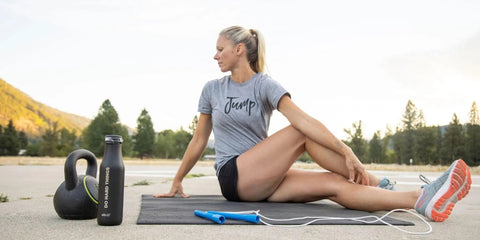9 Tips for Quicker Double Under Mastery
Jun 02, 2021Jordan Lindstrom

Working on your double unders? It can sometime seem like everyone who has ever done a double under knows the "secret sauce" to becoming a master. Unfortunately, not all advice is good advice...
I've coached jump rope for almost 20 years now. Of the hundreds (maybe thousands) of people I've coached, these are the 9 steps I've found make the biggest difference in quickly improving your double under skill.
Video Guide: How to Improve Your Double Unders
If you no good at jumping rope to begin with, double unders will be a huge challenge. It's that simple. Start with the basic skill: a single jump. Once you can do 100 single jumps in a row unbroken, you're ready to move on to double unders.

I can't stress this enough. Spin the rope with your wrists, not your arms. If you're using your arms, two bad things will happen: (1) you'll wear out too quickly (2) you simply can't spin the rope quickly or efficiently enough. This is the most common mistake I see. Practice making circles with just your wrists (and without using your arms) to get a feel for the proper movement.
A rope that is sized properly will spin more quickly and efficiently around your body, which is important for stringing together long sets of double unders. Unfortunately, I too often see people with jump ropes that are WAY too long. I've found the best length is around 6" to 10" of clearance over the head. Use a mirror or a friend to help you with the clearance, and trim down appropriately.
Note: This shorter rope length will force you to jump with better form. You'll find it feels really short if you're used to jumping with your arms way out from your body. This article will help you better understand proper sizing for double unders.

Timing is critically important with double unders, and it can be hard to get your timing down when you're just learning because you'll make mistakes so often, breaking your rhythm. Spend some time practicing without a rope, slapping your thighs twice for every jump. This will help you learn the rhythm without needing to stop when you miss.

Keeping your hands in one place while you jump (vs having them move up and down, or forward and backward) helps with consistency, rhythm and timing. The best hand placement is about 8" - 14" in front of your hips, with your hands fairly close to your sides (not flailing way out). This can be a challenge at first, especially if it feels uncomfortable, but with practice you'll find this is the most efficient placement.
Note: This will really be a struggle if your rope is too long. Longer ropes require you to move your arms further out from your body to spin it quickly. Proper size and proper form go hand-in-hand.

Speed cable ropes are designed for double unders. The handles attach to the rope at a 90-degree for better turning momentum, and the rope is made of steel cable, which cuts through the air much more quickly than PVC or beads. The fastest cable type is bare wire, but it wears out more quickly that coated cable (and it can really sting when you miss).

Kicking your feet back, or "donkey kicking," is a pretty common mistake. It's a function of trying to jump high enough to get the rope through twice. It also forces people to use longer ropes. Improving your form and efficiency by following steps 1 through 6 will help you avoid donkey kicking.

Athletes that pike (legs come out straight in front) tend to hold their arms out straight, resulting in the need for a longer rope to accommodate the longer, straighter arms.

It's not always easy to "be aware" of our form when we're trying to whip through some doubles. Grab a friend and have them watch you jump, looking at your hand position, tempo and form. Are you moving one arm out as you go along? Is your jump height inconsistent? Are you moving all over the place when you jump? Good feedback can help shore up lots of little mistakes.

We're all about equipping and encouraging people to take on big challenges, because we know the process of doing hard things helps us grow in character and capacity.
Frequently bought together
You may also like
1 Comments
Another great way to work on your form is simply to have someone record a video of you. Nearly everyone has the ability to record video with their phones these days, so rather than having someone who probably isn’t a coach and doesn’t have a trained eye for spotting mistakes in form, just have them record a video, with your own phone is even better, and then review the video yourself since you now know several things to watch for after reading this article.